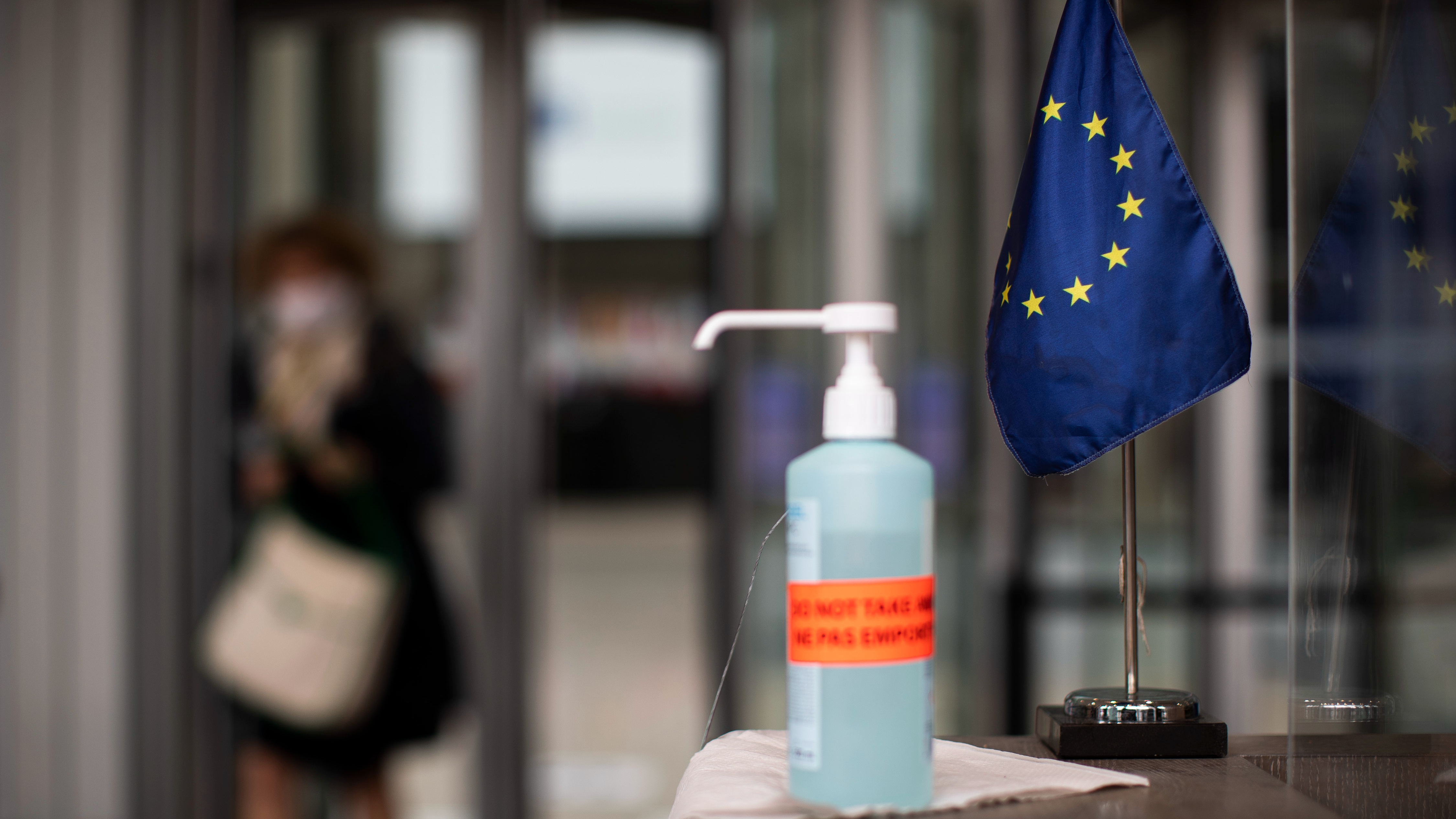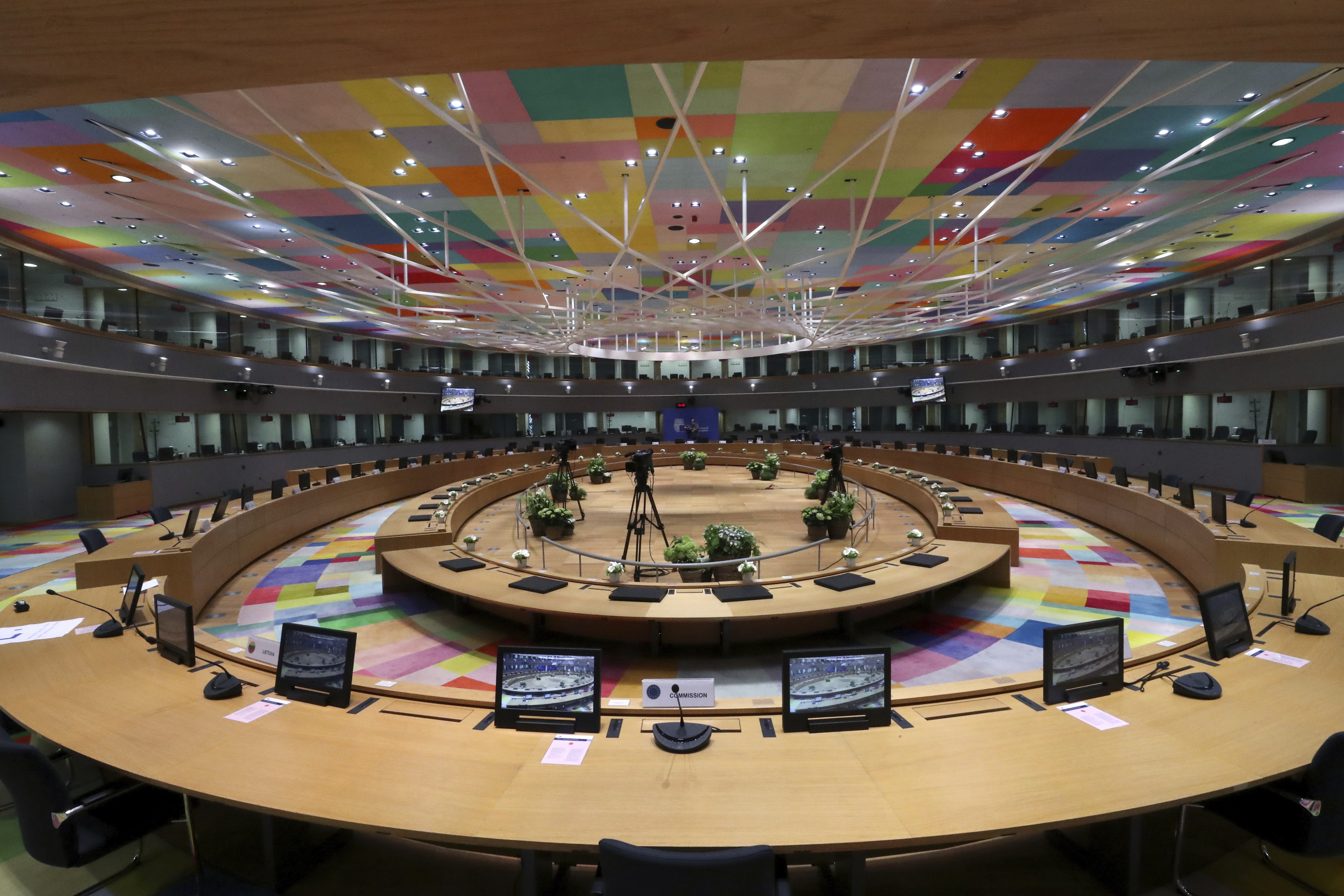
A bottle of hand sanitizer stands next to an EU flag at the entrance to the European Council building in Brussels, Belgium, July 16, 2020. /AP
A bottle of hand sanitizer stands next to an EU flag at the entrance to the European Council building in Brussels, Belgium, July 16, 2020. /AP
Editor's note: Jonathan Arnott is a former member of the European Parliament. The article reflects the author's opinions, and not necessarily the views of CGTN.
If there's one thing that you learn from five years in the European Parliament, it's that deals are usually concluded at the last possible moment. With 27 different nations each having their own view, and the conflicting interests of the Council, Commission and Parliament, it's no wonder that brinkmanship becomes the order of the day. Alliances are formed, changed and broken. Groups of nations sharing similar views work together to promote an agenda.
It's no surprise, then, that the European Union is yet to finalize the next Multiannual Financial Framework – its broad spending plans for the next seven years. The amounts of money involved, when considered in aggregate, are eye-watering. A 1.1-trillion-euro (1.26-trillion-U.S.-dollar) agreement, albeit spread over a number of years, is a huge pot of money. EU leaders will meet at a summit in an attempt to smooth over the key issues.
This time, the issue is being linked to the bloc's plans to bounce back from the coronavirus: a recovery fund which could run to 500 billion euros or even more. Eurosceptics are concerned: they want to take a step back, asking how much of this money really needs to be allocated and spent at European level. Is it not possible, they wonder, to spend money more efficiently directly in the Member States rather than to see everything through the prism of Brussels?
The COVID-19 outbreak has hit different countries in different ways, and at different rates. The virus seems to spread faster in colder and more densely-populated countries. Sweden, which did not lock down, has seen far higher rates than its Scandinavian neighbours (both inside and outside the European Union). Each economy faces different challenges in responding.
But the Eurosceptics are not in control. To the European Union's staunchest supporters, it is the principle which counts. Where there is a problem, they believe there should be Europe-wide solidarity. Thus, the European Union developed its Globalization Adjustment Fund, its Solidarity Fund, and its Investment Plan.

In-house cameras are set up in a meeting room to adhere to physical distance guidelines for an upcoming EU summit at the European Council building in Brussels, Belgium, July 16, 2020. /AP
In-house cameras are set up in a meeting room to adhere to physical distance guidelines for an upcoming EU summit at the European Council building in Brussels, Belgium, July 16, 2020. /AP
Like the single currency itself, the motivation is not necessarily economic: a European Recovery Fund fits their political narrative. Any Fund controlled at EU level permits the European Union to make the rules – opening the door to applying environmental and social conditions to payments. It is this, perhaps, which will sweeten the deal with a European Parliament which contains a sizeable number of euro-federalists.
For all the political questions about intent, actual discussions this weekend will be somewhat more prosaic. Denmark, Sweden, Austria and the Netherlands are less than keen on setting up a 500-billion-euro (570-billion-U.S.-dollar) fund; they prefer a system of loans rather than grants to minimize the long-term burden on Member States to finance the fund. They see it as an opportunity to preach financial discipline, in the words of Dutch Prime Minister Mark Rutte "so that all EU member states are also strong, and in the event of a subsequent blow, such a fund will not even be necessary." Sweden's prime minister is striking the usual tone: intending to be constructive and prepared to negotiate, yet not ruling out using a veto.
On the other side, Italy and Spain face a much larger economic contraction this year. Italy's debt-to-GDP ratio is particularly high, so the prospect of loans will not particularly thrill the Italian government.
There will always be competing interests. EU Council President Charles Michel, representing the Member States, proposed a slightly lower budget for the Multiannual Financial Framework: 1.074 trillion U.S. dollars rather than 1.1 trillion euros. Yet the actual differences between the various parties are relatively small – often no more than a couple of percents. There is scope for compromise: greater restriction on spending, yet permitting the new Recovery Fund; a larger fund (600-750 billion euros) but a mixture of grants and loans, and an eventual budgetary agreement somewhere between the Commission, Council and Parliament proposals.
Most analysts see it as a 50-50 chance that an agreement will be hammered out in principle this weekend. Politicians are playing their cards close to their chests, but France and Germany seem determined to present a united front. Angela Merkel injected a note of caution: "I cannot say today whether we will come to an agreement on Friday or Saturday". A deal of some form is inevitable; the question is merely whether it will happen so soon.
(If you want to contribute and have specific expertise, please contact us at opinions@cgtn.com.)